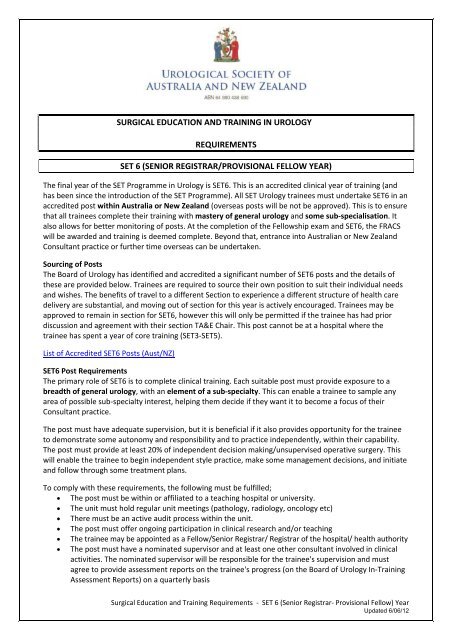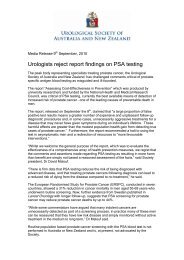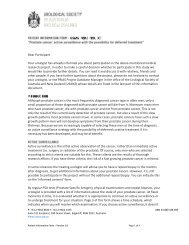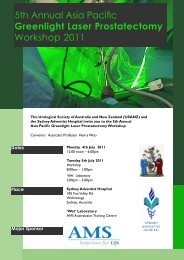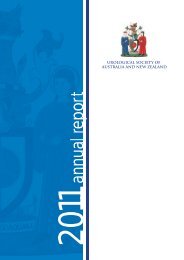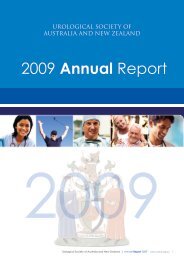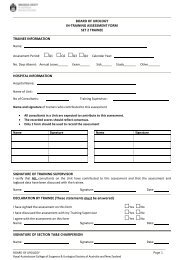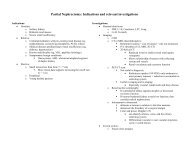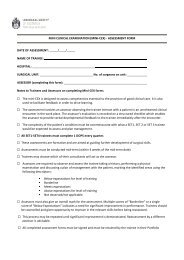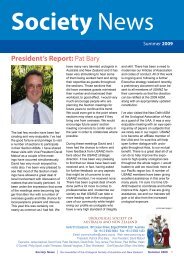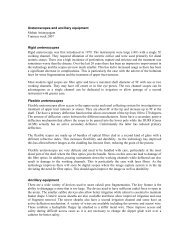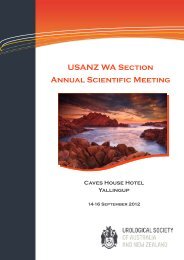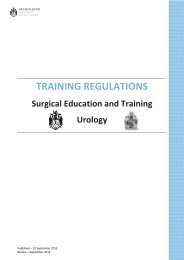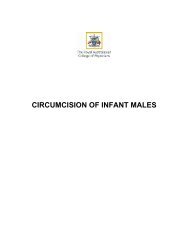senior registrar/provisional fellow year - Urological Society of ...
senior registrar/provisional fellow year - Urological Society of ...
senior registrar/provisional fellow year - Urological Society of ...
You also want an ePaper? Increase the reach of your titles
YUMPU automatically turns print PDFs into web optimized ePapers that Google loves.
SURGICAL EDUCATION AND TRAINING IN UROLOGY<br />
REQUIREMENTS<br />
SET 6 (SENIOR REGISTRAR/PROVISIONAL FELLOW YEAR)<br />
The final <strong>year</strong> <strong>of</strong> the SET Programme in Urology is SET6. This is an accredited clinical <strong>year</strong> <strong>of</strong> training (and<br />
has been since the introduction <strong>of</strong> the SET Programme). All SET Urology trainees must undertake SET6 in an<br />
accredited post within Australia or New Zealand (overseas posts will be not be approved). This is to ensure<br />
that all trainees complete their training with mastery <strong>of</strong> general urology and some sub‐specialisation. It<br />
also allows for better monitoring <strong>of</strong> posts. At the completion <strong>of</strong> the Fellowship exam and SET6, the FRACS<br />
will be awarded and training is deemed complete. Beyond that, entrance into Australian or New Zealand<br />
Consultant practice or further time overseas can be undertaken.<br />
Sourcing <strong>of</strong> Posts<br />
The Board <strong>of</strong> Urology has identified and accredited a significant number <strong>of</strong> SET6 posts and the details <strong>of</strong><br />
these are provided below. Trainees are required to source their own position to suit their individual needs<br />
and wishes. The benefits <strong>of</strong> travel to a different Section to experience a different structure <strong>of</strong> health care<br />
delivery are substantial, and moving out <strong>of</strong> section for this <strong>year</strong> is actively encouraged. Trainees may be<br />
approved to remain in section for SET6, however this will only be permitted if the trainee has had prior<br />
discussion and agreement with their section TA&E Chair. This post cannot be at a hospital where the<br />
trainee has spent a <strong>year</strong> <strong>of</strong> core training (SET3‐SET5).<br />
List <strong>of</strong> Accredited SET6 Posts (Aust/NZ)<br />
SET6 Post Requirements<br />
The primary role <strong>of</strong> SET6 is to complete clinical training. Each suitable post must provide exposure to a<br />
breadth <strong>of</strong> general urology, with an element <strong>of</strong> a sub‐specialty. This can enable a trainee to sample any<br />
area <strong>of</strong> possible sub‐specialty interest, helping them decide if they want it to become a focus <strong>of</strong> their<br />
Consultant practice.<br />
The post must have adequate supervision, but it is beneficial if it also provides opportunity for the trainee<br />
to demonstrate some autonomy and responsibility and to practice independently, within their capability.<br />
The post must provide at least 20% <strong>of</strong> independent decision making/unsupervised operative surgery. This<br />
will enable the trainee to begin independent style practice, make some management decisions, and initiate<br />
and follow through some treatment plans.<br />
To comply with these requirements, the following must be fulfilled;<br />
The post must be within or affiliated to a teaching hospital or university.<br />
The unit must hold regular unit meetings (pathology, radiology, oncology etc)<br />
There must be an active audit process within the unit.<br />
The post must <strong>of</strong>fer ongoing participation in clinical research and/or teaching<br />
The trainee may be appointed as a Fellow/Senior Registrar/ Registrar <strong>of</strong> the hospital/ health authority<br />
The post must have a nominated supervisor and at least one other consultant involved in clinical<br />
activities. The nominated supervisor will be responsible for the trainee's supervision and must<br />
agree to provide assessment reports on the trainee's progress (on the Board <strong>of</strong> Urology In‐Training<br />
Assessment Reports) on a quarterly basis<br />
Surgical Education and Training Requirements ‐ SET 6 (Senior Registrar‐ Provisional Fellow) Year<br />
Updated 6/06/12
The post must <strong>of</strong>fer a minimum <strong>of</strong> 5 sessions a week supervised by a consultant. These sessions<br />
may include operating sessions, outpatient sessions, and substantial clinical discussion meetings.<br />
The trainee should be the primary Surgeon for at least one operating session per week.<br />
No more than 20% <strong>of</strong> the trainee's operating or outpatient work should be unsupervised.<br />
Applications for SET6 (Senior Registrar/Provisional Fellow) Year<br />
Trainees must obtain prospective approval <strong>of</strong> their SET6 post from the Board <strong>of</strong> Urology. In considering<br />
SET6 applications, the Board <strong>of</strong> Urology assesses whether the nominated post will provide the particular<br />
trainee with the required general urology exposure to complement their training. As such, a SET6 post may<br />
be appropriate for one trainee but not for another. Passing the <strong>fellow</strong>ship examination does not mean that<br />
all trainees have attained an equal level <strong>of</strong> clinical skill. Factors considered will include experience gained<br />
during SET3‐SET5 and any competency areas that may require further development/exposure during SET6.<br />
Trainees must complete a SET6 Application Form and forward to the Chairman <strong>of</strong> the Board <strong>of</strong> Urology, via<br />
the USANZ Office.<br />
Application Form ‐ SET6 (Senior Registrar/Provisional Fellow) Year<br />
Applications must also include the following:<br />
<br />
<br />
<br />
a letter <strong>of</strong> <strong>of</strong>fer <strong>of</strong> employment from the nominated Supervisor, hospital or Health Authority<br />
a clinical timetable <strong>of</strong> the position<br />
a letter from Section TA&E Chair supporting post application (this is only applicable to trainees who<br />
intend to remain in their home section)<br />
The Board undertakes to respond to applications within 6 weeks. Approval will be granted provided:<br />
<br />
<br />
the trainee has progressed satisfactorily through SET3‐SET5, attaining sufficient general urology<br />
skills to allow the proposed SET6 post to be considered<br />
the post has been approved by the Sectional TA&E Chairperson and the Board <strong>of</strong> Urology as<br />
appropriate for the trainee to undertake<br />
Trainee Requirements <strong>of</strong> the Senior Registrar Year<br />
During the Senior Registrar <strong>year</strong>, trainees must:<br />
<br />
<br />
<br />
keep a freehand log book <strong>of</strong> procedures and operations for 12 months<br />
keep a record <strong>of</strong> Continuing Pr<strong>of</strong>essional Development which should include research, teaching you<br />
have undertaken, and meetings or conferences attended<br />
conduct a personal audit <strong>of</strong> a selected procedure or procedure and submit a written audit report to the<br />
Board <strong>of</strong> Urology at the completion <strong>of</strong> the <strong>year</strong><br />
The Audit requirement is an exercise in Quality Assurance. Shortly after commencing your term, select a<br />
particular procedure or limited set <strong>of</strong> procedures you would like to monitor for performance and outcomes.<br />
Collect outcome data prospectively for all <strong>of</strong> these procedures for six months. The collected data should be<br />
collated, and the results compared to published series. Ideally, you will have had significant input to the<br />
performance <strong>of</strong> these cases. You should then prepare a short report <strong>of</strong> comparative outcomes, conclusions,<br />
and intentions for personal future practice.<br />
As SET6 is considered a core <strong>year</strong> <strong>of</strong> training and requires the same level <strong>of</strong> monitoring as other <strong>year</strong>s,<br />
progress will be assessed on a quarterly basis. SET 6 trainees will need to submit an In‐Training Assessment<br />
Report and Logbook Summary to the TA&E Chairperson in their Section <strong>of</strong> origin every 3 months for<br />
ratification by the Board <strong>of</strong> Urology.<br />
Additionally, the Board requires each SET6 trainee to provide a Confidential Post Assessment Report at 6<br />
and 12 months.<br />
Each report should describe the benefits and experience gained together with a summary <strong>of</strong> how the<br />
trainee’s aims and objectives have been achieved, the research or teaching undertaken and their<br />
Surgical Education and Training Requirements ‐ SET 6 (Senior Registrar‐ Provisional Fellow) Year<br />
Updated 6/06/12
perspective on the strengths and weaknesses <strong>of</strong> the post. The submitted report will become the property<br />
<strong>of</strong> the Board <strong>of</strong> Urology and will not be made available to the post about which it was written.<br />
A recommendation to Fellowship will only be forthcoming when all <strong>of</strong> the Senior Registrar Year<br />
requirements have been completed and submitted. In summary, these include;<br />
<br />
<br />
<br />
<br />
4 x 3 monthly In‐Training Assessment Reports and Logbook Summaries<br />
A record <strong>of</strong> CPD (at the end <strong>of</strong> the term)<br />
The Audit report (at the end <strong>of</strong> the term)<br />
2 post assessment reports (6 and 12 months)<br />
The CPD record, audit report and post assessments reports must be returned directly to Deborah Klein at<br />
the USANZ Office.<br />
Surgical Education and Training Requirements ‐ SET 6 (Senior Registrar‐ Provisional Fellow) Year<br />
Updated 6/06/12


